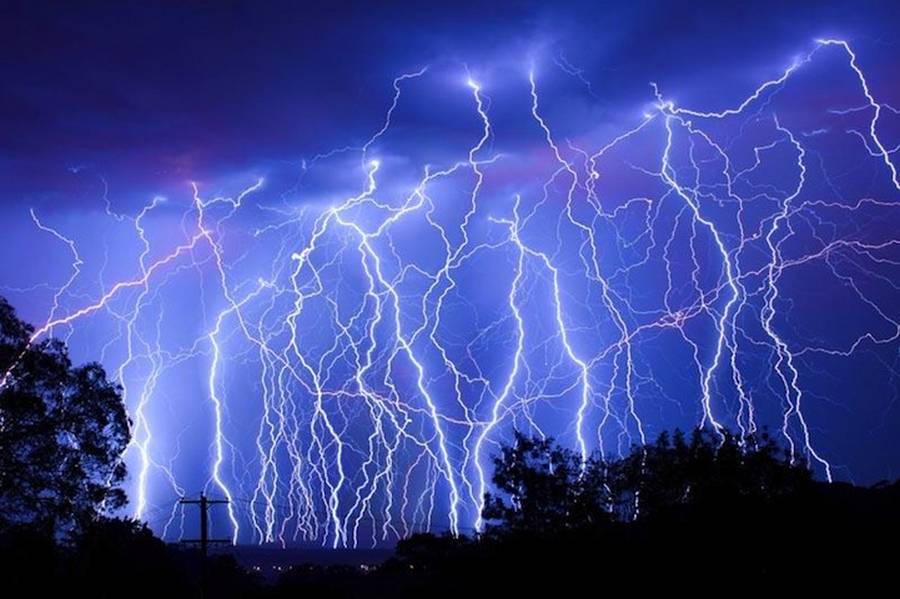A man in California was killed when lightning struck people at Venice Beach on Sunday. Several other people were injured, including one man who was playing volleyball and told ABC 7 “it felt like someone punched me in the back of my head.”
Storms and lightning strikes of this nature are extremely rare in California, as Angela Fritz outlines at Capital Weather Gang. And while fatal lightning strikes are also rare across the country, they are still a danger, as dozens of people are killed by lightning each year.
So far this year, at least 16 people have been killed by lightning strikes in the United States, according to the National Weather Service:

As of July 28, 2014. (National Weather Service)
The death in Venice on Sunday was the first for California this year, but it was the eighth lightning-related death so far this month, according to the list of fatalities kept by the NWS.
Although this is a rather bracing fact — fully half of the people killed by lightning this year in the United States were killed in this month alone — it fits with a pattern that sees lightning deaths climb in the summer, with June, July and August seeing the highest numbers each year, according to the National Oceanic and Atmospheric Administration. (This makes sense, because it is when people are likeliest to be out and about, but the numbers remain troubling.)
These deaths have occurred in 10 states across the country and they have occurred at beaches, national parks, on highways and in backyards. Thomas Coburn Wartell was killed by lightning while riding his motorcyclein New Mexico, the state police said. James Donald McDaniel, a 71-year-old in Florida, was struck and killed by lightning while picking blueberries.
Lightning strikes killed two people in two days at Rocky Mountain National Park earlier this month; Rebecca R. Teilhet was killed on July 11, while Gregory Cardwell died the following day, the National Park Service said. The death on Sunday in California was the second to occur on a beach this year, following the death of Scott Wilcox last week in Florida. (Occurrences like these are why the Ironman competition in Lake Placid, N.Y., opted tocancel a round of swimming over the weekend due to thunder and lightning.)
Since 2006, there have been 277 people killed by lightning strikes in the United States. The number of fatal lightning strikes has declined in recent years, as this graphic shows:

As of July 28, 2014. (NOAA/NWS)
Many of the people struck and killed by lightning “were either headed to safety at the time of the fatal strike or were just steps away from safety,” John S. Jenesius Jr., a lightning safety specialist for NOAA, wrote in an analysis of lightning strikes between 2006 and 2013.
“For many of the lightning victims, safe shelters were available; however, the victims simply did not act soon enough to get to safety before they were struck,” he wrote. This highlights why it is so important that people seek shelter rather than waiting to see if conditions improve and why people in charge of outdoor activities need to act quickly, he said.
(One odd quirk that shows up over the years: Men are much, much more likely to be killed by lightning than women. Eight in 10 victims since 2006 were men, according to the NWS data. Jenesius outlined a number of possible explanations in his analysis — maybe men are unwilling to be inconvenienced, or they don’t react quickly enough, or they are in areas where it’s difficult to find shelter quickly enough — but the end result is that men remain at a much higher risk of being struck and killed by lightning.)
Jenesius’s analysis also showed that while golfers — who stand in the middle of open areas for hours and hours and hours at a time — are perceived to be the group that suffers the most lightning strikes, that isn’t actually true. Lightning killed more than three times as many people who were fishing than people who were golfing between 2006 and 2013, he wrote. And the number of people struck and killed while camping or boating was also about double the number of people who were golfing.
The best guidance for such people is to make sure a safe shelter is available if you’re going to be fishing, boating, camping or golfing, Jenesius wrote. And if the weather says storms could be coming, it would be a good idea to postpone your camping trip, he noted.


No comments:
Post a Comment